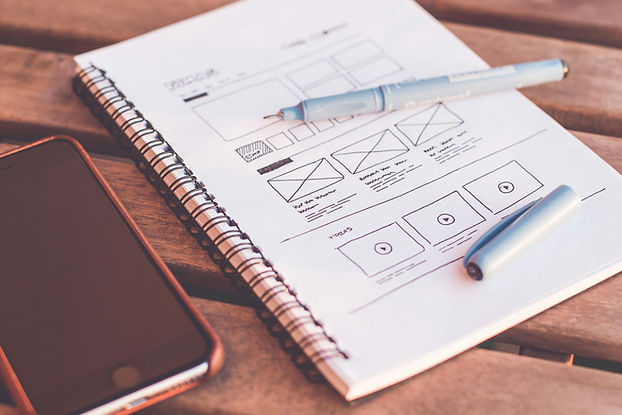Spring Term classes: 5th January – 28th March

What's On?
From coding & electronics to AI, robotics, databases, GUI design & full-stack web development... there’s loads happening this summer for ages 6 to 18.
Click on the sections below to find out more!
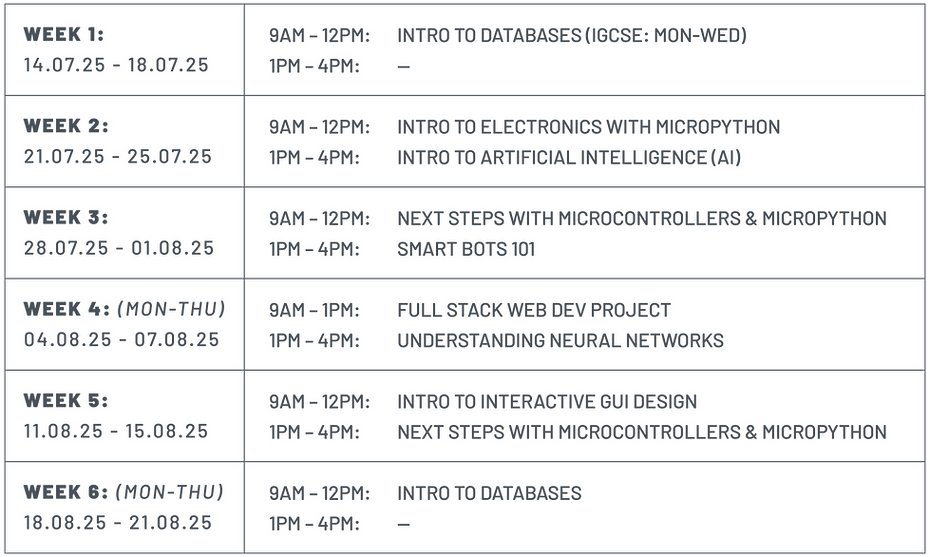


Python Coding courses and workshops
Join our Summer School Coding Programmes for an inspiring and structured journey into the world of code. Every day, students will explore new computational concepts through engaging logic challenges and creative activities tailored to their age and experience level.
These hands-on workshop sessions are designed to build confidence, teach real coding skills, and help young learners think like programmers... whether they're brand new to coding or already writing Python independently.
At DiscoG, we use our "4 C's of Coding" — Creativity, Computational Thinking, Critical Thinking, and Collaboration — to make learning fun, meaningful, and connected to real-world ways of working.
Come for a few sessions or join us all summer... you’re in control!
Highlights:

-
Learn core programming skills through fun, age-appropriate challenges and games
-
Explore Python fundamentals including loops, logic, variables, and functions
-
Work on real coding projects that build independence and creativity
-
Gain problem-solving and computational thinking skills for life
-
Learn in small groups with our supportive, expert team!
2 or 3-hour workshops | Year 1 – 13+
(No previous coding experience is required. Students work independently on their own projects. Existing students and members will continue to build on their programming knowledge to strengthen their skills and prepare for a new academic year!)


FOR MAKERS, BUILDERS, AND HANDS-ON LEARNERS
WHO WANT TO GET STUCK IN WITH TECH.
Scroll down to learn more about our courses:

INTRO TO ELECTRONICS WITH MICROPYTHON
Get hands-on with real-world tech in this exciting electronics course. Students will use the Raspberry Pi Pico W and MicroPython to explore how code interacts with physical components. From light sensors to motion sensors, this course introduces the building blocks of modern electronics through creative and engaging circuit-based projects.
Highlights:
-
Learn how to build circuits using a breadboard and electronic components
-
Use sensors, LEDs, buzzers, and more to bring projects to life
-
Learn how to code can control hardware in real time
-
Work with MicroPython in a hands-on, practical environment
-
Explore the foundations of physical computing and embedded systems
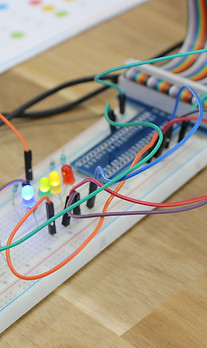
15-hour course | Year 7+
(Suitable for students with a range of experience levels. Some familiarity with Python is helpful, but not essential.)

Next steps with microPython & microcontrollers
This course is designed for students who have already completed our introductory Pico W electronics course and are ready to take their skills further. Building on their existing knowledge of breadboards, sensors and MicroPython, students will dive into more complex and creative circuit-based projects. They'll explore how different components can interact, respond to inputs, and be programmed to behave in new and exciting ways.
Highlights:
-
Expand on previous electronics and coding knowledge
-
Work with new sensors and more advanced input/output logic
-
Design circuits that respond intelligently to real-world conditions
-
Use MicroPython to write more structured and purposeful programs
-
Strengthen problem-solving and debugging skills through hands-on projects
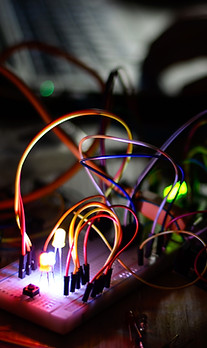
15-hour course | Year 7+
(Suitable for students who have completed our Introductory Course, or who have experience with python and physical computing basics.)

Robotics Lab
Explore the world of robotics in our custom-built Robotics Lab, where students learn to control and programme real robotic arms using logic, coding, and creativity. Whether they're new to robotics or ready to take on more advanced programming, these workshops offer a hands-on way to develop algorithmic thinking and real-world tech skills.
Each course builds on the last... They're all fun, challenging, practical, and packed with lightbulb moments!
Courses in this track:
🤖 1. Introduction to Robotics
-
Discover how to control a robotic arm by designing clear, step-by-step instructions
-
Format: 15-hour course | For students going into Year 6+
🧠 2. Robotics & Block-Based Programming
-
Learn to design algorithms that control a robotic arm with precision
-
Format: 3-hour workshop sessions | For students going into Year 7+
👨💻 3. Programming Robots with Python
-
Program a robotic arm using Python to perform real-world tasks
-
Format: 3-hour workshop | For students going into Year 8+
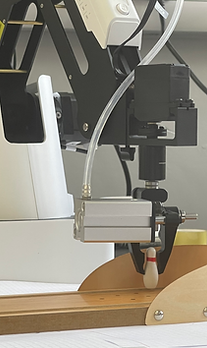


For thoughtful coders, creative designers and AI-curious minds who want to understand and shape the tech of tomorrow.
Scroll down to learn more about our courses:

Smart bots 101
In this exciting coding course, students will explore the world of Artificial Intelligence by creating a series of fun and imaginative mini bots using Python. Each project introduces a new AI-inspired concept, from decision-making and memory to randomness and responses.
The course is specially designed to break down big, complex ideas into simple, age-appropriate activities. By the end, students will have built their own mini smart bots and start thinking like young computer scientists.
Highlights:
-
Discover the logic behind how AI makes decisions
-
Create bots that simulate memory, mood, and conversation
-
Use loops, conditionals, and lists to build dynamic behaviour
-
Learn core AI ideas through code-based activities
-
Develop real Python skills in a creative and engaging way

15-hour course | Year 5+
(Suitable for students with some familiarity with basic Python (e.g. input, print, if/else) who are ready to explore more advanced ideas in a fun and accessible way.)

Intro to Artificial Intelligence (AI)
What does it really mean for a machine to "think"? In this course, students will explore the theory behind Artificial Intelligence, from how AI systems make decisions to the role they play in everything from search engines and smart assistants to medical tools and self-driving cars. Through discussion, hands-on simulations, and creative exercises, students will gain a strong foundation in how AI works, why it matters, and how it's shaping our world.
Highlights:
-
Expand on previous electronics and coding knowledge
-
Work with new sensors and more advanced input/output logic
-
Design circuits that respond intelligently to real-world conditions
-
Use MicroPython to write more structured and purposeful programs
-
Strengthen problem-solving and debugging skills through hands-on projects
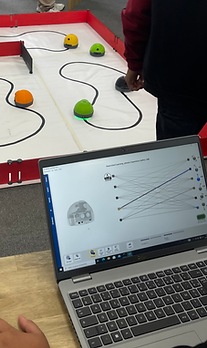
15-hour course | Year 7+
(Only available for students with sufficient experience in Python. Students without prior coding knowledge may find the pace challenging.)

Understanding neural networks
This course is designed for students who have already explored the basics of AI and are ready to take their understanding further. Focusing on one of the most important areas of modern AI—neural networks—students will explore how machines can be trained to recognise patterns, make decisions, and simulate learning.
Through discussion, interactive examples, and guided activities, students will break down how neural networks are structured, how data flows through them, and how they're used in real-world applications like image recognition and natural language processing. They'll also look at the challenges and risks of these powerful systems, including bias, overfitting, and interpretability.
Highlights:
-
Explore how neural networks simulate the human brain's structure and function
-
Understand layers, inputs, weights, and outputs in a simplified and accessible way
-
Use real-world scenarios to model how AI learns and predicts
-
Dive deeper into machine learning methods like supervised and unsupervised learning
-
Discuss the ethical risks and limitations of large AI systems
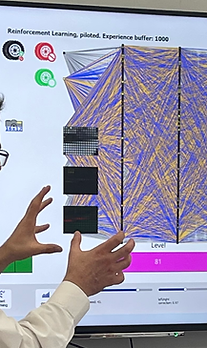
12-hour course | Year 8+
(Recommended for students who have completed our Introduction to AI course, or who already have a grasp of basic AI concepts.)

Intro to GUI design
Get a first taste of how software comes to life on screen! In this creative coding course, students will explore how to design and build simple user interfaces using the power of Python. It's a hands-on introduction event-driven programming, where the flow of execution is determined by events (e.g. keyboard presses, mouse clicks, timers, etc.), and where ideas turn into real-world applications.
Highlights:
-
Learn event-driven programming
-
Explore core programming concepts through structured projects
-
Work with real code using a text-based editor
-
Learn to think like a developer and apply computational thinking
-
Build confidence with more advanced Python techniques
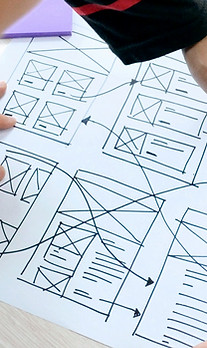
15-hour course | Year 8+
(Only available for students with sufficient experience in Python. Students without prior coding knowledge may find the pace challenging.)

Intro to databases
What actually happens behind the scenes when you save information, search for a name, or log into an account? In this course, students will be introduced to the world of databases, the powerful systems that store, organise, and manage the world's information.
Using SQL, a beginner-friendly and widely used database system, students will learn how to create SQL queries, and update their own databases using real code. Through structured exercises and hands-on projects, they will develop a strong foundation in how data is stored, updated, deleted, and accessed efficiently.
Highlights:
-
Learn how databases are used in websites, apps, and software systems
-
Understand key concepts like tables, records, queries, and relationships
-
Write SQL scripts and python code to insert, search, and manage data
-
Build simple, practical database projects to reinforce each concept
-
Develop real-world skills in data management and logic

12-hour course | Year 9+
(For students with coding experience, who are comfortable using text-based code, and want to expand their knowledge in data handling and storage.)

Full stack web dev project
In this advanced coding course, students will take on the exciting challenge of designing and building a full stack web application, just like a professional developer. Working with a mix of front-end and back-end tools, they'll learn how web products are structured, styled, connected to real data, and deployed live to the web. From the first sketch of an idea to the final line of code, this course empowers students to think like a developer, write purposeful code, and bring their own web-based project to life. It's the perfect next step for confident Python coders ready to work across an entire tech stack, and to start creating exciting project that can be added to their portfolio.
Highlights:
-
Learn how front-end (HTML, CSS, JS) & back-end (Python, Django) tools work together
-
Build and connect a live database using SQL
-
Use PythonAnywhere to host and deploy a working web application
-
Understand the role of routing, forms, and logic in real-world websites
-
Gain confidence using command-line tools and project-based development workflows

16-hour course | Year 10+
(Only suitable for students with strong Python experience and confidence working in a text-based coding environment.)
